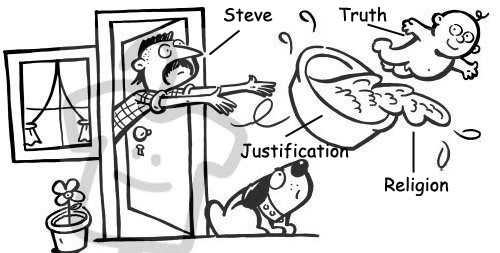
July 26, 2010
Religion – Holy Brain Damage
As an interlude to our examination of the first dispensation we’ve been looking at some of the terms that the Eden narrative introduced – the first being justification and in the last couple posts, the specific form known as “religion”.
Religion consists of actions we engage in to justify our wrongs and/or pay our guilt debt. In last week’s abbreviated post, I showed how religion gains galvanizing strength by being a communal worldview as well as a personal justification.
Not all religions are in a church
Like all comparative thinking, religion is easier and more comfortable than the alternative. Religion does not require objective, critical thought. In fact it discourages it. There is no need for independent thought when you have established dogma to guide your actions, and a high priest directing your mentality (and by high priest, I don’t just mean guys in ceremonial clothing. Al Gore, Karl Marx, Richard Dawkins, Carl Sagan, and Oprah count as the high priests of their particular sects)
It’s easier and more comfortable to keep following the rituals you grew up with and which have been in your family and/or culture for generations than to break with entrenched tradition.
It’s easier to embrace a system that makes you feel good and superficially addresses your inherent knowledge that you are less than perfect, than deal with the idea that you can do nothing to be perfectly righteous on your own.
It’s easier to believe that this world is all there is and that you can perfect it (and yourself) by “saving” it via environmentalism or activism, than it is to see the world as fleeting and transitory.
It’s easier to believe that there is no God, and that Right and Just are effects of the universe instead of it’s cause, than to accept the idea that the existence of absolute Righteousness would require that we be accountable for our actions.
The lure of religion
Because religion is a socially acceptable form of mass comparative thinking, it is readily and easily embraced. Because it does such a good job imitating contrastive thinking, it is extremely effective at discouraging the pursuit of true righteousness. And because it encourages the vain comfort of self-righteousness (perhaps the most toxic form of comparative thinking) it is extraordinarily difficult to let go of.
But for the remainder of this post, I want to specifically focus on the damage caused by religion done “in the name of God”. Performing works to justify yourself and slapping God’s name on it does not make it righteous. In fact, its self-delusion because God specifically says that our works are unacceptable in relation to true righteousness.
So why do we do it? Pride! It is easier to take some credit for our righteousness than to accept our relative inadequacy before a perfectly righteous God. If we feel that we have “partnered” with God for our righteousness, it makes us feel a little better about ourselves. It gives us a little self-esteem and self-worth. But a little pride is still pride.
Escalating brain damage
The reason that religion is so damaging is that it associates itself with God while being in diametric opposition to God’s way to gaining righteousness! When non-religious people are exposed to religious adherents, their subconscious recognizes that religion is just another man-centered form of justification that damages the brain and really does nothing to alleviate guilt. However, since religion clothes itself in divinity and falsely associates itself with God, people come to believe that God Himself must be as illogical, self-contradictory, hypocritical, comparative, oppressive and futile as the people who practice religion. So they throw the baby out with the bathwater and completely reject all things called “God”. Thus, they put themselves in danger of missing the meaning of life.
But it’s even worse for the religious adherents themselves. At least those who use non-religious Justification of Man to deal with their guilt, subconsciously know that they are merely rationalizing their wrongs. They are under no theological delusions regarding the source of their justification. The lack of guilt-satisfaction they get leaves them open to the possibility of being contrastive at some point.
But religious adherents are convinced (or have been convinced) that their religious efforts are required, needed, and/or appealing to God. So when their Acts of Justification do not alleviate their subconscious guilt, religious adherents don’t get contrastive (because they think their actions are divinely inspired).
Instead they figure that they are not being religious enough! So they get more religious! They intensify their acts of justification. They get more comparative! It’s a vicious circle that escalates the more it’s practiced.
If the contradictory irrationality of Justification of Man causes brain damage, then religion is a brain damage tsunami! This is how religious people can rationalize and justify suicide bombings, inquisitions, holy wars, holocausts, ethnic cleansing, etc. This is how certain religious Jews in the first century justified the torture and killing of the Son of the God they claimed to worship.
Biblical religion?
But isn’t the Bible full of rules and rituals that people were instructed to follow in order to please God? Next time we’ll wrap up our discussion of religion by looking at man’s first religious act, exploring why Biblical doctrine is often confused with religion, and finally, we’ll begin to see where atonement comes in. Stay tuned.
Related Podcast
Remember to subscribe to this blog to receive new posts when they are published

